Ibsen’s Ghosts
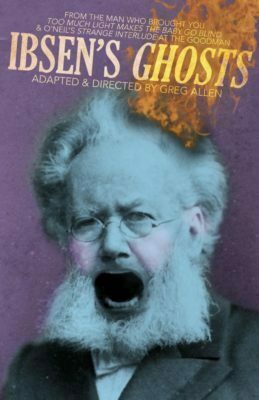 An Original Adaptation of the Play by Henrik Ibsen
An Original Adaptation of the Play by Henrik Ibsen
Written and Directed by Greg Allen
Produced by Mary-Arrchie Theatre Company
At Angel Island, Chicago
Ibsen’s Loving Parodists Salute Him
Listen to my interview with Greg Allen.
Greg Allen knows his Ibsen. The Neo-Futurists founder previously staged The Last Two Minutes of the Complete Works of Henrik Ibsen in 2005, and in his new, highly self-referential adaptation of Ghosts, main character Mrs. Alving has several collections of the nineteenth century Norwegian playwright’s works piled up on her desk. Allen hasn’t changed any major plot points, or even most of the dialogue. However, the mostly humorous touches he adds completely transform the work from what was once a naturalistic play struggling to break free from the conventions of melodrama into a mildly absurdist and much more engaging play which cuts past the shock-value of incest, euthanasia, and venereal disease, to the core issue of what it means to control one’s own destiny.
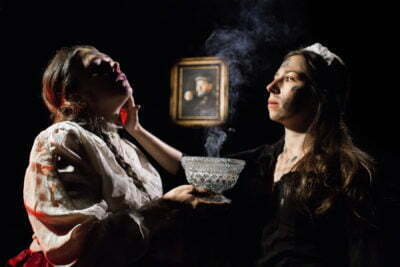
Some context: Ghosts was Ibsen’s third prose play. As was common at the time, it was published before ever being performed, in 1881, and debuted in a Danish-language production in Chicago the following May. Twelve years later, it was publically performed for the first time in London, and the critical establishment’s freak-out became the stuff of theatre legend. One critic declared “Ninety-seven per cent of the people who go see Ghosts are nasty-minded people who find the discussion of nasty subjects to their taste in exact proportion to their nastiness.” Another called it “gross, almost putrid indecorum,” and another, “crapulous.” The story concerns Mrs. Alving (Carolyn Hoerdemann), a small-town widow who is in the final stages of opening an orphanage. Her charitable partner, Pastor Manders (Stephen Walker), arrives the day before he is to give the dedication speech to warn her that by insuring it, they would seem to be doubting a higher power’s protection. She agrees to leave it uninsured, mostly to get him to stop badgering her, and then reveals its true purpose.

Mrs. Alving’s husband was a lying, cheating drunk who she remained with purely out of a sense of duty to her social station, which she now regrets. Manders is shocked; she had come to him early in her marriage and begged him to take her in, but he sent her back, believing Mr. Alving to be a good man, and nothing he saw of them thereafter implied otherwise. Mrs. Alving believes that opening an orphanage in her husband’s name will put to rest rumors about them, but more importantly, it will guarantee that none of his money will go to their son, Oswald (Gage Wallace), who has recently returned on a break from his career as a painter in Paris. Mrs. Alving wants Oswald to inherit from her, alone. Manders worries that Mrs. Alving’s radical reading material has polluted her mind with selfish thoughts of happiness, but he is a poor judge of character. He is currently being deceived by the carpenter Jacob Engstrand (Kirk Anderson), who is pressuring his daughter, Regina (Catherine Lavoie), also Mrs. Alving’s maid, to become a prostitute. Though Mrs. Alving is determined to keep Regina in the house, away from Engstrand, she is horrified when she overhears Regina and Oswald flirting. Regina, she reveals to Manders, is not really Engstrand’s daughter, but her own husband’s, and Oswald may have inherited his father’s restless ways.
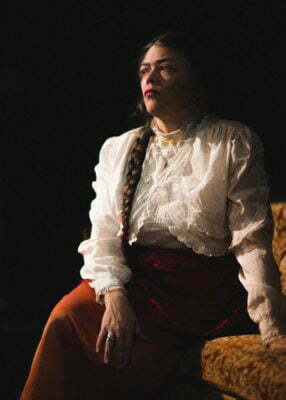
Allen’s program cheekily lists the setting as “a moribund historic store-front theatre on the North Side of Chicago in its final season before it gets turned into bicycle storage for luxury condos.” Indeed, the fourth wall in this production is paper thin when present at all. Upon entering the theatre, we are greeted by Regina, who talks to us about Ibsen in the French she has been practicing in preparation for moving to Paris with Oswald (Lavoie is a native of Montreal). Ibsen fans will enjoy the references Allen scatters throughout the play, such as Engstrand patronizing a bar called The Wild Duck on Gabler Street. But even Ibsen novices will catch that it is unusual for Pastor Manders to cry “oy vey” when Mrs. Alving declares she has no objection to Oswald and Regina’s incestuous relationship as long as they engage in it with full knowledge, as well as much worse declarations he makes later on. Whereas the original Mrs. Alving complained only about being restricted by a conservative society and being haunted metaphorically by the decisions and biological legacy of long-dead people, this one feels like her entire life, down to the words she speaks, has been pre-ordained by a dead person. Pastor Manders warns that she is threatening the narrative structure they all depend on, and it will do her no good.
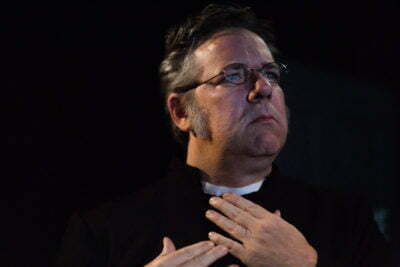
As nice as those additions are, Allen’s directing makes the underlying story work quite well. As a founder of Montreal’s version of the Neo-Futurists, Lavoie is experienced in improv, and pulls off the difficult trick of making pre-show audience interactions friendly and funny, instead of obnoxious. Ibsen did, however, have a real talent for writing jerkasses when he wanted to, as is evident by Engstrand and Manders. Anderson is a brilliantly sly old devil, who makes his character’s sketchiness charming enough to ensnare his dimwitted prey. Stephen Walker’s sonorous tones make Manders, who was written as a mocking caricature of the moralizing Ibsen detested, absolutely hilarious. And yet, his finger-jabbing treatment of everybody around him remains infuriating, and he occasionally ignites with real menace.
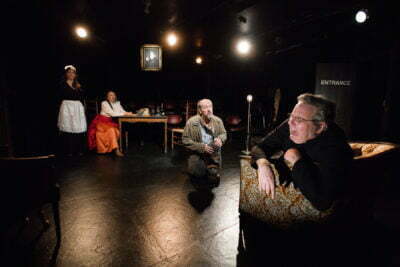
As the play’s most sensible characters, Hoerdemann and Wallace are also the most frequently earnest and exasperated. The ending, which is a perfect blending the original and the adaptation, is quite affecting, due to the humiliation and hopelessness they are suffering from, yet still remaining open. Despite its convoluted story and somewhat overdone dialogue, Ibsen was able to make the final dilemma Oswald presented to his mother a genuinely horrifying and agonizing moment, and Allen, recognizing that, chose not to mess with what made Ibsen worth the effort of reimagining. Was the adaptation strictly necessary? Perhaps not, and meta-theatre can be a little confusing. But the performers are excellent guides, and by freeing us to acknowledge Ghosts’ artificial aspects, Allen has allowed us to focus on the spirit of Ibsenism unencumbered.
Highly Recommended
Jacob Davis
Playing at Angel Island, 735 W Sheridan Road, Chicago. Tickets are $30 with discounts for students and seniors; to order, call 773-871-0442. Performances are Thursdays, Fridays, and Saturdays at 8:00 pm and Sundays at 7:00 pm through December 20. Running time is two hours and ten minutes with one intermission.
